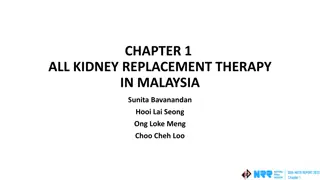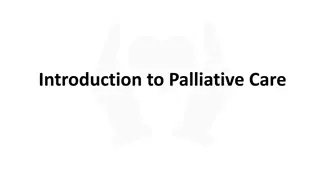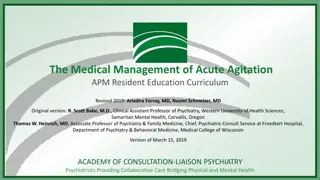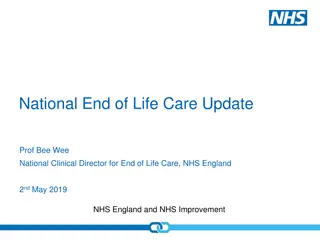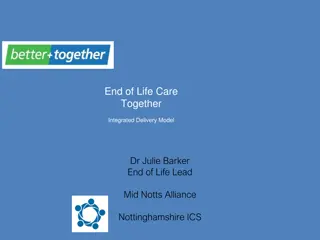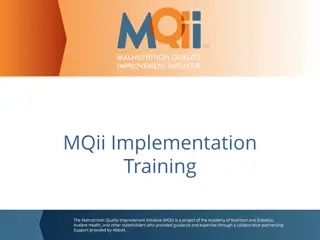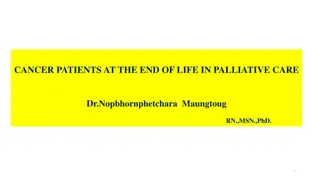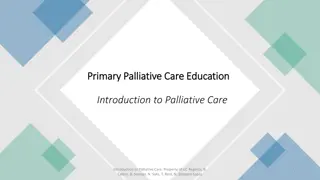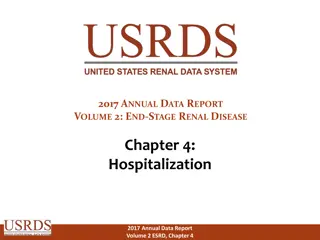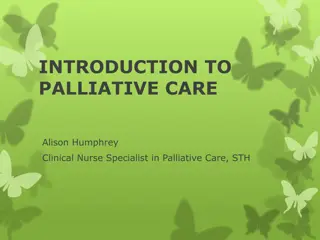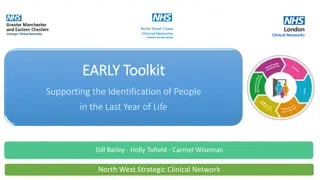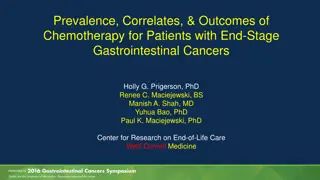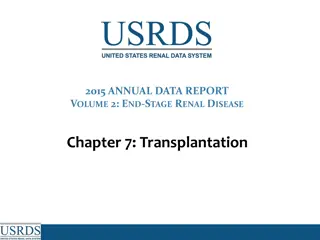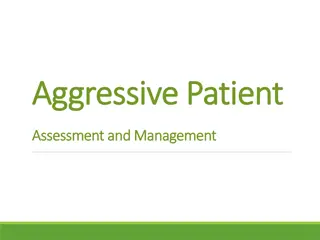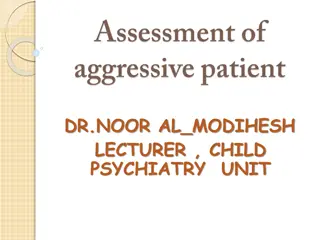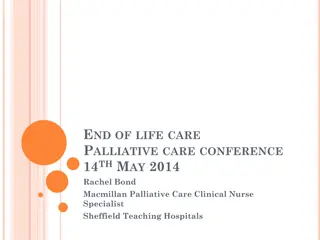Managing Agitation in Patients in End-of-Life Care
Understanding and managing agitation in patients during the final weeks of life is crucial for providing comfort and support. This presentation by Dr. Anne Hounsell covers key aspects such as defining agitation, identifying causes, assessing reversible factors, and implementing non-pharmacological interventions. Effective management involves addressing underlying issues, exploring non-drug approaches, and considering sedative medications as a last resort. By focusing on patient-centered care and involving families and caregivers, healthcare professionals can enhance the quality of life for terminally ill individuals experiencing agitation.
- End-of-Life Care
- Agitation Management
- Patient Comfort
- Terminal Illness
- Non-Pharmacological Interventions
Download Presentation

Please find below an Image/Link to download the presentation.
The content on the website is provided AS IS for your information and personal use only. It may not be sold, licensed, or shared on other websites without obtaining consent from the author. Download presentation by click this link. If you encounter any issues during the download, it is possible that the publisher has removed the file from their server.
E N D
Presentation Transcript
Caring for the Agitated Patient in the Last Few Weeks of Life Dr Anne Hounsell, Speciality Doctor, The Rowans Hospice June 2019
Objectives To consider when sedative medications might be appropriate . -these as last resort .. Definition of agitation. Causes of agitation. Appropriate management at different stages of life. Effect on families, carers, staff and other patients.
Definition of Agitation how does the patient present? Ideas?..... Eg shouting, out of bed, falling, peeing in bin, picking, restless, abusive, aggressive, distressed, withdrawn, confused .. Also hallucinations and altered sleep patterns. Agitation has a variable presentation, we just know they are not comfortable, not settled therefore the cause is the most important thing. Usually associated with delirium
Causes of Agitation Assess 1st * History and examination vital * 40% thought to be (potentially) reversible. Exacerbating and risk factors: Sensory impairment Having a sensitive brain e.g. background dementia, small vessel disease High tumour burden Need to differentiate delirium from depression and dementia
Causes of Agitation continued Potentially reversible Less reversible Hypoxia +++ Brain metastases Infection e.g. LRTI/UTI +/- Terminal agitation (by definition not reversible) Constipation +++ Urinary retention+++ Medication +++ Biochemical causes hepatic, renal, calcium, sodium, glucose +/- Uncontrolled physical symptoms ++ Exestential distress +/- Substance withdrawal alcohol, nicotine ++
Management of Agitation 1) Treat reversible causes/improvable conditions 1stif appropriate 2) Non drug management Medication 3)
Non Pharmacological Management of Agitation Ideas? .. What helped/hindered their success? .. e.g. lighting, noise, temperature, location, orientation, people present, explanation, reassurance, psychological support, routine, personalised activities, hand massage and touch, twiddle blankets/muffs, sleep routine, hydration, music, pet assisted therapy .. It can be very hard!! .and time intensive
Pharmacological Management of Agitation SEDATION .what does it mean to you? The reduction of irritability or agitation by administration of sedative drugs. We need to be very clear (in ourselves, as a team and with the patient /relative) what we mean. Use unambiguous language. What do others mean? Why it isn t harmless Medications have their place but must be used wisely they all have potential problems.
Pharmacological Management of Agitation When to use sedation? Only if 1 and 2 don t work. The dose must be proportional, titrating to symptoms. It is important to document clear justification and goals. Regular reviews. Reduction may be needed. Think of drug interactions. Benzodiazepines, Antipsychotics, Phenobarbitone Others e.g. SSRI (e.g. sertraline) or mirtazapine ..
Benzodiazepines Lorazepam, Temazepam, Diazepam, Midazolam Use if significant agitation is the main issue (and for withdrawal) Can cause paradoxical agitation Drowsiness, increase in confusion and behavioural problems. Can increase risk of falls.
Antipsychotics Haloperidol, Levomepromazine (Olanzapine, Quetiapine, Risperidone) Useful if prominent psychotic features e.g. hallucinations, paranoid delusions (Studies have shown that haloperidol is no better than placebo in helping delirium, in patients with dementia Studies of palliative care patients have shown that haloperidol can even worsen delirium) Avoid in Parkinson s Disease (or Lewy Body dementia) - lowers dopamine levels in the brain Caution long QT syndrome, hypothyroidism, low K, seizures Side effects Extra-pyramidal symptoms (esp. with haloperidol) QT prolongation Anticholinergic SE s -Dry mouth, constipation, urinary retention, delirium Can increase mortality and CVA risk in patients with dementia
Palliative Sedation The induction of a reduced level of consciousness/coma to relieve intolerable (patient defined) suffering in the imminently dying/ in the last days of life. The suffering must be refractory. MDT discussion, clear discussion of goals and outcomes with patient/family and good documentation needed Periodically lighten sedation to reassess?
Potential Problems of Using Sedative Medication . Side effects (see previous) Patient may not be able to finish things/ have final discussions/talk about any psychological or existential distress. Anticipatory grief and loss for the family. May not address any underlying causes that could be managed differently - e.g. complex pain Use with longer prognosis -may reduce ability to eat and drink/induce respiratory depression -may shorten the patient s life.
Review of Objectives Definition of agitation. Variable presentation, do not appear settled. CAM assessment for delirium. Causes of agitation. Many! Some more reversible than others. Exacerbating factors include sensory impairment, background dementia Appropriate management at different stages of life. Addressing any potentially reversible causes/contributing factors. Focussing in non drug management Medications only if needed e.g. benzodiazepines, neuroleptics, phenobarbitone If medications used consider contra-indications/cautions/side effects/consequences - titrate to effect -ensure clear communication and goals
Lastly.. So what is the impact on us?
Thankyou for listening! Any questions?
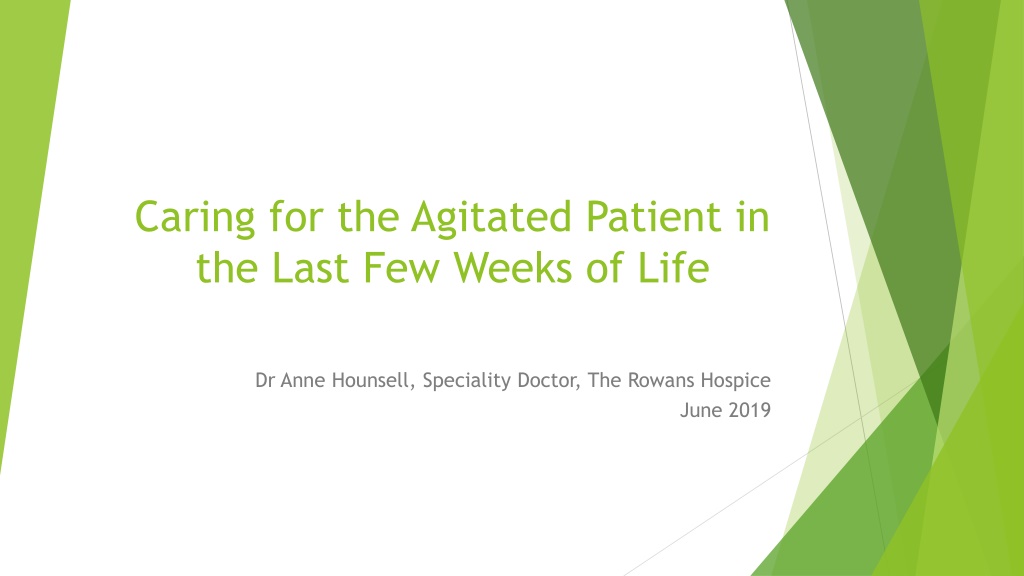
 undefined
undefined



